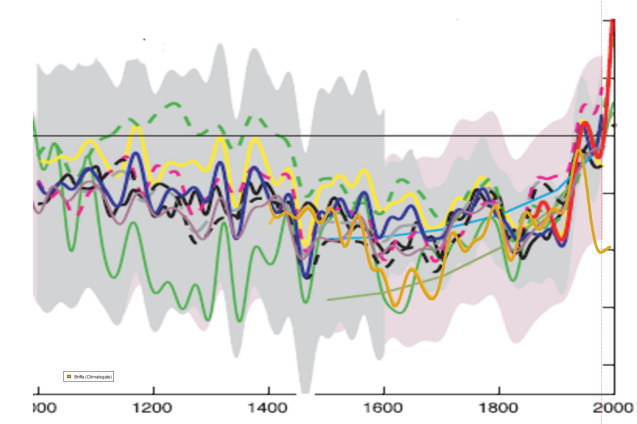Another honest mistake I am sure.
Some background from the original “hide the decline” from Steve McIntyre here
Despite relatively little centennial variability, Briffa’s reconstruction had a noticeable decline in the late 20th century, despite warmer temperatures. In these early articles [e.g. Briffa 1998], the decline was not hidden.
For most analysts, the seemingly unavoidable question at this point would be – if tree rings didn’t respond to late 20th century warmth, how would one know that they didn’t do the same thing in response to possible medieval warmth – a question that remains unaddressed years later.
He writes now in Hide-the-Decline Plus
Indeed, they did not simply “hide the decline”, their “hide the decline” was worse than we thought. Mann et al did not merely delete data after 1960, they deleted data from 1940 on, You can see the last point of the Briffa reconstruction (located at ~1940) peeking from behind the spaghetti in the graphic below:
Detail from Mann et al (EOS 2003) Figure 1. Arrow points to Briffa series peeking out from behind the spaghettiHad Mann et al used the actual values, the decline would have been as shown in the accompanying graphic:
Figure 3. Re-stated Mann et al (EOS 2003) Figure 1 showing the decline.Had Mann and his 13 co-authors shown the Briffa reconstruction, without hiding the decline, one feels that von Storch (and others) might have given more consideration to Soon et al’s criticism of the serious problem arising from the large-population failure of tree ring widths and density to track temperature.
Read the whole article Hide-the-Decline Plus


Read the whole article. Great link.
Tomorrow the heating oil truck comes to fill the tank at $3.30 per gallon. Before I put any logs in the woodstove, I will look at a few pieces and try to guess which years were warm.
For the benefit of all the fellows of AHIW, the graph is deceitful, and if you ever try to play that trick, beware.
There are many ways in the world to make an honest living, as Alexander Hamilton would say. Deceit may carry you far, maybe for decades, but it will catch you. Rizzo, humble about his own limits of knowledge, wants you to be honest, and open to fresh ideas. I believe you understand me.
[…] Fieldnotes from the Consensus (more) […]